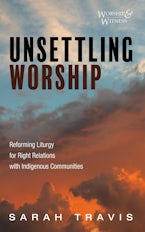
Expansive Language Liturgy: Sighs Too Deep for Words
Pastor Tamika Jancewicz, Pastor Emilie Casey, and Anne Krentz Organ shaped this liturgy entitled Sighs Too Deep for Words (Romans 8:26). This resource gives special attention to women’s experiences in scripture and in everyday life, and it invites embodied prayer. This is a liturgy rooted in scriptural accounts of the breaths, sighs, groans, and shouts of God, humanity, and all creation. The writers have aimed to craft language and music that is not only theologically rigorous and aesthetically beautiful, but also clear, adaptable, and singable. May we pray and sing without knowing exactly what to say, for it is when “we do not know how to pray as we ought” that the “Spirit intercedes with sighs too deep for words.”
See also our Faith Formation: Exploring God lib guide for expanded imagery for the Divine.
A brochure that explains why inclusive and expansive language is important and suggests ways to express the fullness of God’s presence including guidelines for speaking and writing. Produced by the Racial Equity & Women’s Intercultural Ministries in collaboration with the Advocacy Committee for Women’s Concerns (ACWC) PC(USA). Download a free copy here.
From The Plural Guild:
A walk through your congregational hymnbook to discover more of its untapped treasures.

Making sure the songs we sing actually reflect what we believe. Plus, writing songs!
Opening our worship to mystery, beauty and belonging through inclusive language.
Here's a wonderful list of Inclusive Versions of the Prayer of Jesus. I don't know who compiled it, but most of the prayers are cited for use!
P.S. I would not use the title, 'The Prayer of Jesus': so far as we know, this was never a prayer Jesus prayed. This is the Prayer Jesus Taught Us, the prayer Jesus instructed his followers to pray.
Rev. Dr. Cameron Trimble, reflecting on how our words/language create our realities, encourages us to Say What You Mean.
 As we are embraced by God's reconciling love in worship, we are equipped to carry that reconciling love into our relationships beyond the worship space. Worship equips us for the work of conciliation, but the liturgy itself needs to be decolonized if it is to truly honor Christian commitments to God and neighbor. This book explores the reformed liturgy in its pattern of Gathering, Word, Table, and Sending, searching it both for colonial vestiges, and spaces of new possibility. Unsettling Worship invites the reader into a conversation about reformed worship in a setting of ongoing colonization. Worship should both unsettle us, and equip us for the essential work of making things right with Indigenous neighbors.
As we are embraced by God's reconciling love in worship, we are equipped to carry that reconciling love into our relationships beyond the worship space. Worship equips us for the work of conciliation, but the liturgy itself needs to be decolonized if it is to truly honor Christian commitments to God and neighbor. This book explores the reformed liturgy in its pattern of Gathering, Word, Table, and Sending, searching it both for colonial vestiges, and spaces of new possibility. Unsettling Worship invites the reader into a conversation about reformed worship in a setting of ongoing colonization. Worship should both unsettle us, and equip us for the essential work of making things right with Indigenous neighbors.
 Doing the Deeply Spiritual Work of Land Acknowledgment
Doing the Deeply Spiritual Work of Land Acknowledgment
Tracy Kugler, a member of St. Paul's UCC in St. Paul, MN
~includes a strong list of resources for congregational or personal learning
 A Guide to Indigenous Land Acknowledgment was compiled in conversation with a group of Minnesota Indigenous leaders.
A Guide to Indigenous Land Acknowledgment was compiled in conversation with a group of Minnesota Indigenous leaders.

